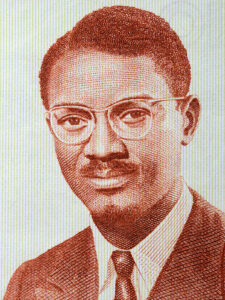 Patrice Lumumba a portrait from Guinean money – Syli
Patrice Lumumba a portrait from Guinean money – Syli
The Young People’s Advisory Group commemorates the 62nd anniversary of the assassination of Congo’s national hero and luminary Patrice Emery Lumumba, Maurice Mpolo and Joseph Okito. These leaders were at the forefront of pan-African and universalist principles and sought the progression and development of the Congolese nation. They were slain for their political ideologies that advocated for complete autonomy and independence from the West and paid a high price for freedom, justice, and equality.
The infamous act of the assassination of these Congolese and universal freedom fighters on January 17, 1961, immortalised them more than anything else. By wanting to silence them, their voices have been amplified internationally, as people around the world have resonated with their universalist principles. To this day, no personalities of a state dead or alive, African, or European, American or Asian are commemorated such as Patrice Lumumba.
The Young People’s Advisory Group believes that the teaching of Lumumba’s life would be a great tool to support young people in the teaching of history. Not only does it highlight the importance of freedom, justice, and equality, but it also serves as a reminder of the sacrifices that were made for these principles. Berthe Walo, Manager of Special Missions at the Congolese National Movement- Lumumba Party, expressed, “Above all the politics, Lumumba’s universalist principles of freedom, justice and equality make him an inspiration for all, irrespective of race, nationality or religion.” Lumumba’s thought leadership serves as a call to action for the current generation to continue the struggle for the betterment of the Congolese nation and its people.
The Young People’s Advisory Group commemorates the 62nd anniversary of the assassination of Patrice Emery Lumumba, Maurice Mpolo and Joseph Okito and calls on the international community to acknowledge the scale of demonstrations observed all over the world after the announcement of their assassination. The group also believes that the teaching of Lumumba’s life would be a great tool to support young people in the teaching of history and serve as a call to action for the current generation to continue the struggle for the betterment of the Congolese nation and its people.
Patrice Lumumba’s life and legacy is an important topic to be taught in schools because it provides a unique perspective on the history of Africa and the struggle for independence and autonomy. It is a story of a leader who fought tirelessly for the rights and dignity of his people and paid the ultimate price for his beliefs. By learning about Lumumba, students can gain insight into the political, social, and economic challenges that faced the Congo during the time of his leadership, as well as the broader issues of colonialism, racism, and imperialism that continue to shape the world today.
One of the key benefits of teaching about Patrice Lumumba in schools is that it can help to promote a deeper understanding of African history and culture. Lumumba’s story is an important part of the historical narrative of the Congo, and by learning about him, students can gain a deeper understanding of the country’s past and the factors that have shaped its present. Additionally, by studying Lumumba’s life and legacy, students can learn about the importance of leadership, courage, and sacrifice in the face of adversity.
Furthermore, studying Lumumba’s life in the classroom can promote critical thinking and analysis among students. By learning about the challenges he faced and the decisions he made, students can develop their own perspectives on historical events and understand the complexity of the situation. This can also encourage students to question the dominant narratives in history and seek out alternative perspectives, fostering critical thinking and analysis skills.
Additionally, learning about Lumumba’s life can also help to promote cultural awareness and understanding among students. Lumumba’s story is not only an important part of the history of the Congo, but it also resonates with people around the world who have struggled for freedom and autonomy. By learning about Lumumba, students can gain a deeper understanding of the shared experiences and struggles of people from different cultures and backgrounds, and develop a more inclusive and compassionate worldview.
In conclusion, teaching Patrice Lumumba’s life in schools is important to provide a unique perspective on the history of Africa and the struggle for independence and autonomy, promote a deeper understanding of African history and culture, foster critical thinking and analysis skills, and promote cultural awareness and understanding. Lumumba’s legacy is not only an important part of the history of the Congo, but it also resonates with people around the world who have struggled for freedom and autonomy.
